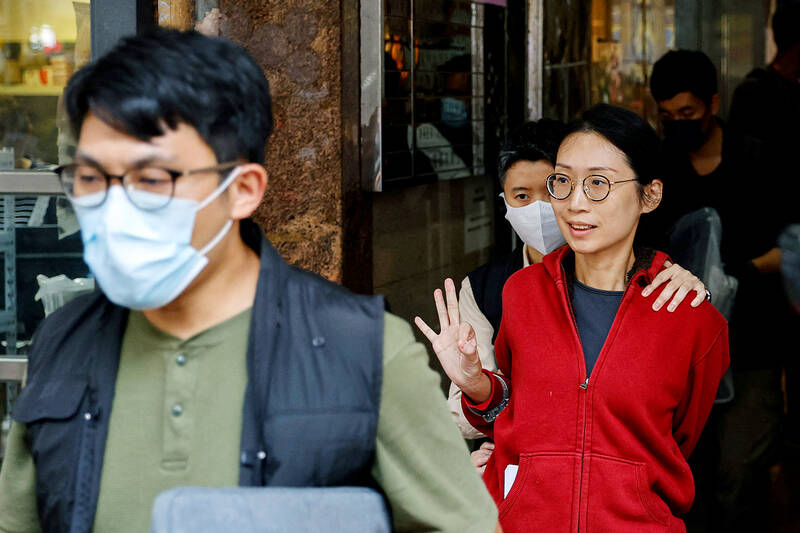Hong Kong police yesterday arrested 10 people under the National Security Law, accusing them of providing financial support to overseas dissident groups pushing for sanctions against the Chinese territory.
Beijing imposed the National Security Law on Hong Kong in 2020 after huge and sometimes violent pro-democracy protests the year before. Critics say the law has curtailed political freedoms and quashed dissent.
Authorities yesterday said that four men and six women, aged 26 to 43, were arrested for “conspiracy to collusion with a foreign country or external elements” — an offense under the security law that can carry a sentence of up to life in prison.

Photo: REUTERS
“Police investigation revealed that the arrested persons were suspected of conspiracy to collude with the ‘612 Humanitarian Relief Fund,’” the police statement said, referring to a now-defunct fund that helped pay legal and medical costs for people arrested during the 2019 protests.
The 10 people were suspected of receiving donations “from various overseas organizations to support people who have fled overseas or organizations which called for sanctions against Hong Kong,” it said.
Police also cited “inciting riot” as grounds for the arrests and did not rule out more.
The fund disbanded in October 2021 after national security police demanded it hand over details that included information about its donors and beneficiaries.
Authorities have accused the group in recent years of fomenting dissent among jailed protesters and scrutinized its ties with Hong Kong activists who have fled overseas.
Five of the fund’s trustees, including the elderly Cardinal Joseph Zen (陳日君), were arrested in May last year for foreign collusion.
The five trustees and the fund’s secretary were convicted and fined in November for the less serious crime of failing to properly register the fund. They have since filed an appeal against their convictions, but no hearing date has been set.
As of last month, 260 people have been arrested under the National Security Law, with 79 of them convicted or awaiting sentencing in Hong Kong.

Former Nicaraguan president Violeta Chamorro, who brought peace to Nicaragua after years of war and was the first woman elected president in the Americas, died on Saturday at the age of 95, her family said. Chamorro, who ruled the poor Central American country from 1990 to 1997, “died in peace, surrounded by the affection and love of her children,” said a statement issued by her four children. As president, Chamorro ended a civil war that had raged for much of the 1980s as US-backed rebels known as the “Contras” fought the leftist Sandinista government. That conflict made Nicaragua one of

COMPETITION: The US and Russia make up about 90 percent of the world stockpile and are adding new versions, while China’s nuclear force is steadily rising, SIPRI said Most of the world’s nuclear-armed states continued to modernize their arsenals last year, setting the stage for a new nuclear arms race, the Stockholm International Peace Research Institute (SIPRI) said yesterday. Nuclear powers including the US and Russia — which account for about 90 percent of the world’s stockpile — had spent time last year “upgrading existing weapons and adding newer versions,” researchers said. Since the end of the Cold War, old warheads have generally been dismantled quicker than new ones have been deployed, resulting in a decrease in the overall number of warheads. However, SIPRI said that the trend was likely

NUCLEAR WARNING: Elites are carelessly fomenting fear and tensions between nuclear powers, perhaps because they have access to shelters, Tulsi Gabbard said After a trip to Hiroshima, US Director of National Intelligence Tulsi Gabbard on Tuesday warned that “warmongers” were pushing the world to the brink of nuclear war. Gabbard did not specify her concerns. Gabbard posted on social media a video of grisly footage from the world’s first nuclear attack and of her staring reflectively at the Hiroshima Peace Memorial. On Aug. 6, 1945, the US obliterated Hiroshima, killing 140,000 people in the explosion and by the end of the year from the uranium bomb’s effects. Three days later, a US plane dropped a plutonium bomb on Nagasaki, leaving abut 74,000 people dead by the

Indian Prime Minister Narendra Modi is to visit Canada next week, his first since relations plummeted after the assassination of a Canadian Sikh separatist in Vancouver, triggering diplomatic expulsions and hitting trade. Analysts hope it is a step toward repairing ties that soured in 2023, after then-Canadian prime minister Justin Trudeau pointed the finger at New Delhi’s involvement in murdering Hardeep Singh Nijjar, claims India furiously denied. An invitation extended by new Canadian Prime Minister Mark Carney to Modi to attend the G7 leaders summit in Canada offers a chance to “reset” relations, former Indian diplomat Harsh Vardhan Shringla said. “This is a